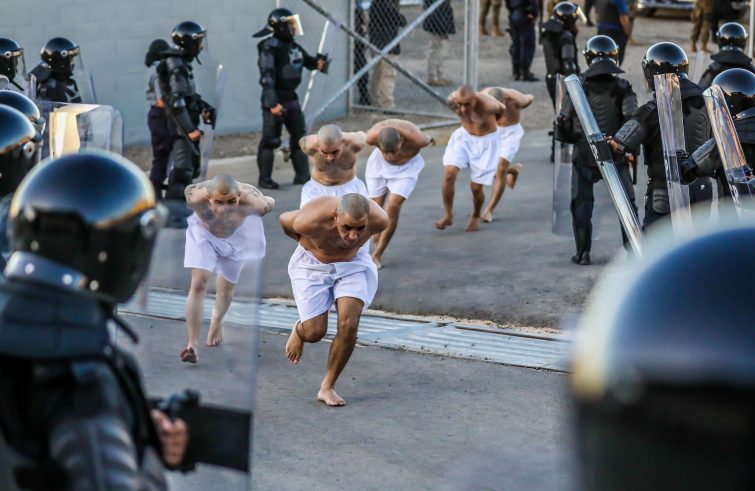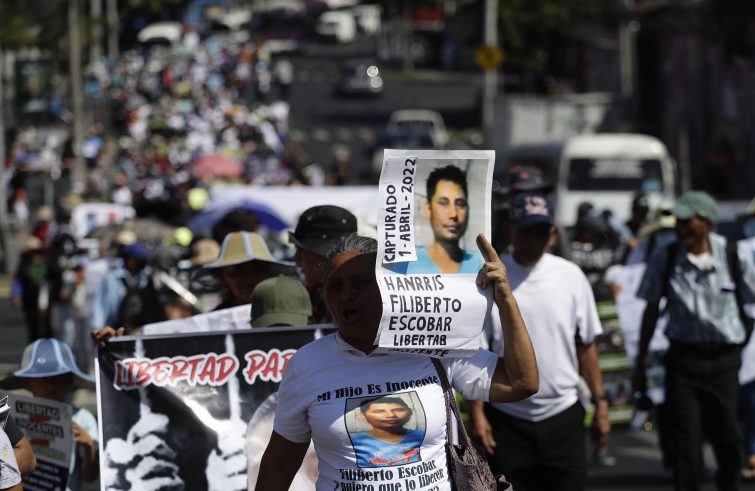
Does the crackdown on criminal activity in the country of the Maras – the violent criminal gangs operating at international level – justify the suspension of fundamental democratic rights and detention without charge of thousands of young people? It does for the majority of the population of El Salvador. It does not in the opinion of numerous civil society organisations and the Salvadoran Catholic Church. This past 27 March, a peculiar anniversary was ‘celebrated’ in the country: namely, the institution of the State of Exception, twelve months ago, (although the Constitution stipulates a one-month limit) by controversial President Najib Bukele who negotiated “under-the-counter” agreements with the Maras and Pandillas criminal gangs to stem the tide of murders, and who declared war against criminal groups.
Restrictions on human rights. Measures that restrict freedoms of peaceful assembly and association have been in place for more than a year, inviolability of correspondence and telecommunications rights have been abolished, guarantees to exercise defence rights have been denied. The government likewise imposed indefinite detention, arrest without an order of a magistrate, and it can take 72 hours for a person under arrest to find out what he is being charged with.
Over one hundred inmates have died in the country’s prisons in the past few months, in circumstances yet to be determined. Two per cent of the Salvadoran population is in prison, mostly young people. By way of comparison, this figure is twenty times higher compared to the Italian situation. Moreover, it’s the highest in the world.
President Bukele enjoys a high approval rate, also thanks to his ‘iron fist’ against criminal groups. The Academic Institute for Public Opinion (‘IUDOP’) of the ‘José Simeón Cañas’ University of Central America, conducted a comprehensive survey among the Salvadoran population one year after the institution of the State of Exception. The findings suggest a widespread degree of ignorance, since roughly three out of four citizens are unaware of the suspension of certain rights. Respondents approved the government provision with a flattering vote (7.92 out of a maximum of 10). The greatest endorsement rate was found among respondents with the lowest level of education and among the rural population.
The ‘price’ of security. Contacted by SIR in San Salvador where he is based, Card. Gregorio Rosa Chávez, auxiliary bishop emeritus of the archdiocese and former secretary of the martyred Archbishop Oscar Romero, gave an extremely critical opinion. “The IUDOP survey is serious and upsetting. In practical terms, people are hardly aware of what the State of Exception entails, they are not informed and they do not realise that the rule of law is at stake. In fact, freedoms are being suppressed in the name of security, the rationale being that this is the price for citizens’ serenity.” The cardinal, a critical conscience in the country, whose views are held in high regard by the population, spoke out against the government’s measures at a highly solemn moment last March 24, during the Mass marking the anniversary of the martyrdom of Archbishop Romero. On that occasion the Cardinal posed the same questions that had been asked by the Saint Archbishop, namely: “How can you sleep peacefully, knowing that the exception has become the rule, that is, the norm? How can you accept as normal the fact that people who suffer cannot express themselves publicly? How can you consider it normal that all avenues for dialogue are being barred?” Referring to the situation in prisons, he added: “I like to picture the Pope suddenly arriving in El Salvador and asking to visit Mariona or Tecoluca (the names of the main prisons, Ed.’s note), it would be interesting, it is worth dreaming.”

The homily’s words of denunciation ring true: “There is no rule of law in the country right now, nor is there a judicial system that would ensure a fair trial. Granted, the government continues to enjoy a high level of popularity. People are just concerned about being safe in their homes. In the meantime, young people living in at-risk areas, in areas of vulnerability, are being put in prison, without a specific reason for their detention, their sole fault is if they come from areas where the Pandillas, the criminal gangs, are actively operating.” A solution to the quagmire the country plunged into is hard to find: “Education is key. However, for now, there is no dialogue with the government, not even on the part of the Church. Questions on ‘habeas corpus’ – to know the charges brought against persons arrested – remain unanswered. Under the existing laws, any pretext is good to arrest someone, whoever is under suspicion. This in turn makes prevention and human promotion initiatives difficult to implement – given the risk of being imprisoned.”
The Church’s concern for young people. While the situation in the capital and its hinterland is characterised by this iron fist, the situation in the suburban or mountainous areas is not much different either. Monsignor Oswaldo Escobar Aguilar, bishop of Chalatelango, remarked: “Under our Constitution, the State of Exception can last for a month, but it has been in effect for a whole year. The government’s sole intervention is repression, with no room for other options. The result is that young people are leaving, as we have seen in a frontier diocese: criminal delinquency, the economic crisis, and now the risk of being arrested for no reason… Increasing numbers of people are emigrating, with 300,000 Salvadorans having emigrated over the past few years.” The Church, in synergy with civil society – however fragile – is doing its utmost to foster youth empowerment: “We have implemented seven projects in the diocese, ranging from farming to incentives for entrepreneurship, including through microcredit. We try to provide stable jobs, as opposed to informal employment, which is growing. But young people are attracted by the mirage of an easy life in the United States, they see luxury, large houses… Here they are left with uncertainties.” In contrast, the Church, and not only, has a hard time trying to reintegrate into society young people implicated in criminal gangs, especially in the Maras, the most organised and widespread of these groups: “They are virtually mafia-like groups, extremely powerful. There have been a few attempts, but only sporadic. The ringleaders of these criminal groups kill whoever tries to thwart their plans.”










